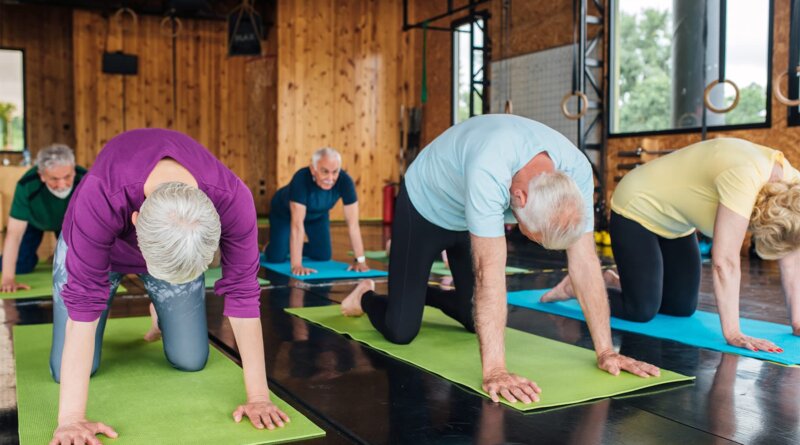Yoga Can Benefit Older Adults, Including Those With Memory Loss
Oct. 4, 2022 — Paige E, a 76-year-old retired psychotherapist, had always enjoyed yoga, which she found relaxing, invigorating, and spiritually meaningful. As she grew older and faced increasing physical challenges, she began taking yoga classes for seniors.
When the COVID-19 lockdown began, Paige was concerned that she might need to give up yoga classes. She knew she could practice on her own but felt she needed the structure of a class and the support of an instructor. So she decided to take online classes with Howard Katz, a Teaneck, NJ-based yoga instructor, with whom she had taken in-person classes in the past.
At first, she was skeptical whether the online format would be useful.
“I’m not very tech-savvy — in fact, I’m a tech dinosaur — and I worried that I wouldn’t be able to manage the technology or relate to a virtual format,” she says.
She was also concerned because she has some brain challenges and wasn’t sure how they would impact her ability to participate in online learning.
“I don’t have classic dementia or Alzheimer’s, but I do have memory and organizational issues that are related to other health problems,” she says.
Fortunately, she was able to master the technology and benefit from the classes.
Feasible and Safe
Online yoga became part of the “new normal” during the COVID-19 pandemic, and its use has remained since then. And although some people prefer in-person settings, many continue to prefer the convenience, affordability, and other benefits of online yoga.
This is also true for classes targeting seniors, including those with cognitive impairments. A recent study found that a remotely offered home-based chair yoga intervention was helpful for older adults with dementia.
“The telehealth-based chair yoga intervention was found to be convenient to both participants and their caregivers in keeping them physically active, as it was easily accessible from home and did not require transportation or getting dressed, which reduced caregiver burden and stress,” says senior researcher JuYoung Park, PhD, a professor in the Phyllis and Harvey Sandler School of Social Work at Florida Atlantic University’s College of Social Work and Criminal Justice.
Seniors with dementia “can focus on the chair yoga intervention more effectively in a comfortable home environment rather than in a community center, with its associated distractions,” she explains.
Notably, there were no injuries or other adverse events during the intervention, “indicating that online chair yoga with caregiver support is safe.”
Park stresses that some people might face technological challenges in accessing online sessions, so tech support should be provided if necessary. And “since the instructor cannot engage in direct action with the participant, it’s recommended that a caregiver attend sessions with the person with dementia, monitor the participant for safety, and assist in following the poses correctly.”
What Is Yoga for Seniors?
Katz teaches older adults in senior centers and also offers online and in-person group and private classes to seniors through his own yoga studio.
“Senior yoga is regular yoga made accessible for older adults who might experience age-related physical challenges,” says Katz.
“With seniors, I usually start with gentle warm-ups, then guide them through basic standing forward bends, gentle back bends, and warrior poses,” says Katz.
Props such as blocks, straps, and chairs are offered, and postures are modified to accommodate the physical challenges of seniors.
“Some seniors can’t sit on the floor because they have difficulty getting up, so I modify the postures so that they can sit on a chair. Some have difficulty with balance, so they hold onto the chair or wall,” Katz notes. In fact, half the postures in his Yoga for Seniors classes are seated, while the other half are standing.
Katz’s yoga classes emphasize breathing techniques. In particular, he likes to teach alternate nostril breathing (Nadi Shodhana), ocean-sounding breath (Ujjayi), and bee-breath (Brahmerie) which are calming for people with anxiety and stress and have other benefits as well — like lowering blood pressure, for example.
All of Katz’s classes include meditation, which, he says, can bring calm, peace, and spiritual opening to people of all ages and has also been shown to be helpful in improving cognition and quality of life in seniors.
“I regard yoga postures and breathing as preparation for the most important component of yoga, which is meditation,” he explains.
Addressing the Special Needs of Seniors With Cognitive Challenges
Katz offers private in-person and online classes to people with cognitive impairments.
“Classes are highly individualized, and all the components are modified, depending on the student’s cognitive level and needs,” he says.
For example, he simplifies the breathing techniques or postures and explains everything more slowly, repeating instructions and explanations as often as necessary.
Some individuals with mild cognitive impairment can take classes alone. But those with more severe impairments or with dementia benefit from having a caregiver present for safety and to reinforce the yoga lesson, according to Katz.
“It also creates a shared bond and activity for the caregiver and the student to do yoga together,” he says.
Paige’s cognitive impairments are mild. She lives independently, does not require a caregiver, and successfully takes online classes with Katz, who “is patient and supportive when I don’t remember some things,” she says. “He explains things well, so I understand what each posture is designed to accomplish, and he creates a safe atmosphere, so I never feel rushed or judged.”
Paige feels that yoga has helped her physical health, cognition, and mood.
“Yoga is a gift in my life, and I encourage other seniors to try it,” she says.




